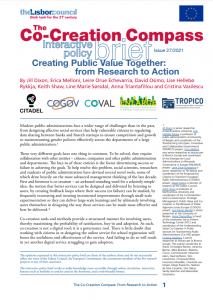Collaborating to understand user involvement – a joint initiative of five Horizon 2020 projects
18 Jun 2021 | Published by TROPICO Team
 Lise H. Rykkja and Line M. Sørsdal (University of Bergen) have contributed to a joint policy brief called “The Co-Creation Compass: Creating Public Value Together: From Research to Action” from TROPICO and our four sister projects: Understanding Value Co-Creation in Public Services for Transforming Public Administrations (Co-VAL); Co-Production and Co-Governance: Strategic Management, Public Value and Co-Creation in the Renewal of Public Agencies across Europe (COGOV); Energies for Local Administrations to Renovate Governance in Europe (ENLARGE); and Empowering Citizens to Transform European Public Administrations (CITADEL). The work on the policy brief was coordinated by the Lisbon Council.
Lise H. Rykkja and Line M. Sørsdal (University of Bergen) have contributed to a joint policy brief called “The Co-Creation Compass: Creating Public Value Together: From Research to Action” from TROPICO and our four sister projects: Understanding Value Co-Creation in Public Services for Transforming Public Administrations (Co-VAL); Co-Production and Co-Governance: Strategic Management, Public Value and Co-Creation in the Renewal of Public Agencies across Europe (COGOV); Energies for Local Administrations to Renovate Governance in Europe (ENLARGE); and Empowering Citizens to Transform European Public Administrations (CITADEL). The work on the policy brief was coordinated by the Lisbon Council.
The involvement of citizens, users, and other service providers in the creation of public services and policymaking has become increasingly important over the last decades. Involving these groups can not only ensure the necessary legitimacy, but also promises to improve the quality and effective delivery of services. Such co-creation is still a relatively new way of designing public services, and is thus, to some degree still an expedition into the unknown. Therefore, governments that decide to make this radical strategic choice and focus more on users – not only as final recipients of public services but also as players involved in service delivery, from business to government to civil society – need to find a suitable approach.
TROPICO research shows that the success of increased collaboration and co-creation is highly dependent on the organisational design of the collaboration. The role of leadership and management in the participatory process cannot be underestimated. It helps to ensure accountability, legitimacy, and trust, and make the collaboration with users meet the set expectations.
The joint policy brief also raises the topic of digitalisation, and explains why, despite the usefulness of ICT tools in involving citizens in the process of creating and developing services, analogue services and face-to-face interactions remain very important to include the users in decision-making.
Why is organizational design essential for a collaboration? How to ensure necessary information and knowledge sharing as well as mutual learning? What qualities should a leader have in order to drive and enhance collaborative processes and co-creation? What can be done to safeguard collaboration’s accountability and legitimacy, and why is trust crucial in the process?
The joint policy brief features findings and joint insights from the collaborating H2020 projects, and provides more focused observations to policy and practice, highlighting the need for a shift in public service delivery, putting citizens first and using modern management practices to co-define and co-deliver new services. It explores what such co-creation entails, the role of research in solving challenges connected to collaborative initiatives aiming at user involvement, and what factors can make them succeed (or fail). Finally, the brief outlines several success factors for the implementation of collaborative initiatives involving both citizens and private actors.
Download and read the policy brief here.
To read more about the initiative, visit: https://lisboncouncil.net/publications/the-co-creation-compass-from-research-to-action/
